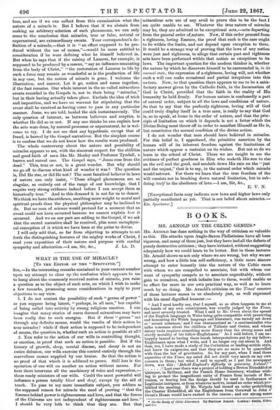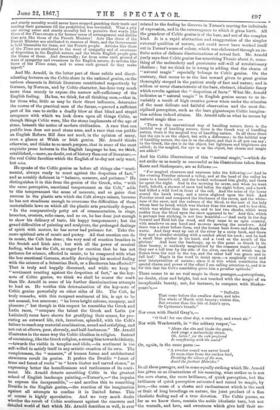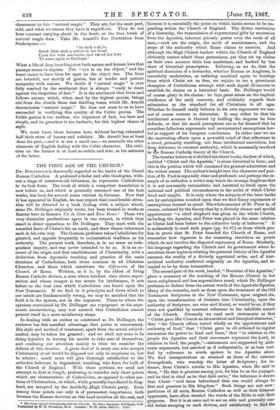BOOKS.
MR. ARNOLD ON THE CELTIC GENIUS.* MR. ARNOLD has done nothing in the way of criticism so valuable as this. His attacks upon Anglo-Saxon Philistinism have all been vigorous, and many of them just, but they have had all the defects of purely destructive criticism ; they have irritated, without suggesting adequately how we could learn to be better. But in these lectures Mr. Arnold shows us not only where we are wrong, but why we are wrong, and how a little less self-sufficiency, a little more sincere attempt to enter honestly into the nature of the Celtic races with whom we are compelled to associate, but with whom our want of sympathy compels us to associate unprofitably, without gain to ourselves, and with infinite loss to them, would enable us to effect far more in our own practical way, as well as to learn much by so doing. Mr. Arnold's criticism on the Times' censure of these lectures. seems to us absolutely just, as well expressed with his usual dignified humour:— "And I need hardly say, that I myself, as so often happens to me at the hands of my own countrymen, was cruelly judged by the Times, and most severely treated. What I said to Mr. 0 wen about the spread of the English language in Wales being quite compatible with preserving and honouring the Welsh language and literature, was tersely set down as arrant nonsense,' and I was characterized as a sentimentalist who talks nonsense about the children of Taliesin and Ossian, and whose dainty taste requires something more flimsy than the strong sense and sturdy morality of his fellow-Englishmen.' As I said before, I am un- happily inured to having these harsh interpretations pat by my fellow- Englishmen upon what I write, and I no longer cry out about it. And then, too, I have made a study of the Corinthian or leading-article style, and know its exigencies, and that they are no more to be quarrelled with than the law of gravitation. So, for my part, when I read these asperities of the Times, my mind did not dwell very much on my own concern in them ; but what I said to myself, as I put the newspaper down, was this : Behold England's difficulty in governing Ireland!'"
"Last year there was a project of holding a Breton Eisteddfod at Qnimper, in Brittany, and the French Home Secretary, whether wish- ing to protect the magnificent unity of France from inroads of Bre- tonism, or fearing lest the design should be used in furtherance of Legitimist intrigues, or from whatever motive, issued an order which pro- hibited the meeting. If Mr. Walpole had issued an order prohibiting the Chester Eisteddfod, all the Englishmen from Cornwall to John o' Groat's House would have rushed to the rescue ; and our strong sense
On the Study of Celtic Literature. By Matthew Arnold. London : Smith, Eider, end Co.
and sturdy morality would never have stopped gnashing their teeth and rending their garments till the prohibition was rescinded. What a pity our strong sense and sturdy morality fail to perceive that words like those of the Times create a far keener sense of estrangement and dislike than acts like those of the French Minister! Acts like those of the French Minister are attributed to reasons of State, and the Government is held blameable for them, not the French people. Articles like those of the Times are attributed to the want of sympathy and of sweetness of disposition in the English nature, and the whole English people gets the blame of them. And deservedly; for from some such ground of want of sympathy and sweetness in the English nature, do articles like those of the Times come, and to some such ground do they make appeal."
And Mr. Arnold, in the latter part of these subtle and discri- minating lectures on the Celtic share in the national genius, on the various elements in British literature contributed respectively by German, by Norman, and by Celtic character, has done very much more than merely to expose .the narrow self-sufficiency of the English feeling. He has, we think, for all thinking men,—that is, for those who, little as may be their direct influence, determine the course of the practical men of the future,—proved a sufficient part of his case to strike a deadly blow at that blind and stupid arrogance with which we look down upon all things Celtic, as though things Celtic were, like the stone implements of the age of stone, beneath the notice of modern civilization. A race that can puddle iron does not need stone axes, and a race that can puddle an English Reform Bill does not need, in the opinion of many, even a glance at Welsh or Irish genius. Mr. Arnold thinks otherwise, and thinks to so much purpose, that in some of the most exquisite prose lectures in the English language he has, we think, established,—more, no doubt, out of history Than out of literature,— the real Celtic faculties which the English of to-day not only want,
but miss.
He speaks of the Celtic genius as before all things else " senti- mental, always ready to react against the despotism of fact," and as notably deficient in " balance, measure, and patience." He distinguishes it in this from the genius of the Greek, who, "with the same perceptive, emotional temperament as the Celt," adds to this temperament the sense of measure, and so gains that success in the plastic arts which the Celt always misses, because he has not steadiness enough to overcome the difficulties of those
materialistic laws on which all the plastic arts practically depend. " In the comparatively petty art of ornamentation, in rings,
brooches, crosiers, relic-cases, and so on, he has done just enough to show his delicacy of taste, his happy temperament ; but the grand difficulties of painting and sculpture, the prolonged dealings of spirit with matter, he has never had patience for. Take the more spiritual arta of music and poetry. All that emotion can do in music, the Celt has done ; the very soul of emotion breathes in the Scotch and Irish airs ; but with all the power of musical feeling, what has the Celt, so eager for emotion that he has not patience for science, effected in music, to be compared with what the less emotional German, steadily developing his musical feeling with the science of a Sebastian Bach, or a Beethoven has effected?" That is truly and happily discerned, and while we keep to " sentiment reacting against the despotism of fact," as the key- note of Celtic genius, we think we shall be nearer the mark than Mr. Arnold in some of his further discriminations attempts to lead us. He verifies this determination of the key-note of Celtic genius powerfully on other sides of life. The Celt, he truly remarks, with this rampant sentiment of his, is apt to be not sensual, but sensuous ; " he loves bright colours, company, and pleasure ;" but though in this respect he resembles the Greek and Latin races, " compare the talent the Greek and Latin (or Latinized) races have shown for gratifying their senses, for pro- curing an outward life, rich, luxurious, splendid, with the Celt's failure to reach any material combination, sound and satisfying, and not out at elbows, poor, slovenly, and half-barbarous." Mr. Arnold illustrates in the same way the Celtic idealism in religion. Instead of containing, like the Greek religion, a strong bias towards idolatry, —towards the visible in temples and idols,—its sentiment is too self-willed to satisfy itself in any artistic creation of its own. The completeness, the " measure," of human forms and architectural structures revolt its genius. It prefers the Druidic " forest of trees and forest of rocks" to " hewn timber and carved stones," as expressing better the boundlessness and restlessness of its senti- ment. Mr. Arnold detects something Celtic in the greatest school of English landscape painting,—Turner's,—" the impulse to express the inexpressible," — and ascribes this to something Druidic in the English genius,—the reaction of the imagination against all attempts to confine it in limited forms. This of course is highly speculative. And we very much doubt whether the revolt of Celtic sentiment against the concrete and detailed world of fact which Mr. Arnold describes so well, is ever
related to the feeling he discerns in Turner's craving for infinitude of expression, and in the extravagance to which it gives birth. All the grandeur of Celtic genius is of the bare, and not of the complex kind. It is a rapid abstraction and exaggeration of the simpler external qualities of nature, and could never have worked itself out in Turner's sense of colour, which was elaborated through an in- finite series of delicate discriminations of actual fact. Mr. Arnold justly says that Celtic genius has something Titanic about it, some- thing of the melancholy and passionate self-will of revolutionary idealism ; but we think he is wrong in adding that the charm of " natural magic " especially belongs to Celtic genius. On the contrary, that seems to us the last reward given to great genius thoroughly steeped in the patient study of fact and nature, and is seldom or never characteristic of the bare, abstract, idealistic fancy which revolts against the " despotism of facts." What Mr. Arnold indicates as " natural magic " in English genius seems to us in- variably a result of high creative power when under the stimulus of the most delicate and faithful observation and the most dis- ciplined perception, such as the bare gigantesque Celtic imagina-
tion seldom indeed attains. Mr. Arnold tells us what he means by natural magic thus :—
"There is the conventional way of handling nature, there is the faithful way of handling nature, there is the Greek way of handling nature, there is the magical way of handling nature. In all these three last the eye is on the object, but with a difference ; in the faithful way of handling nature, the eye is on the object, and that is all you can say ; in the Greek, the eye is on the object, but lightness and brightness are added ; in the magical, the eye is on the object, but charm and magic are added."
And his Celtic illustrations of this " natural magic,"—which do. not strike us as nearly as successful as his illustrations taken from Keats and Shakespeare, are as follows :-
" For magical clearness and nearness take the following And in the evening Peredur entered a valley, and at the head of the valley he came to a hermit's cell, and the hermit welcomed him gladly, and there he spent the night. And in the morning he arose, and when he went forth, behold, a shower of snow had fallen the night before, and a hawk had killed a wild fowl in front of the cell. And the noise of the horse• scared the hawk away, and a raven alighted upon the bird. And Perodur stood and compared the blackness of the raven, and the white- ness of the snow, and the redness of the blood, to the hair of the lady whom best he loved, which was blacker than the raven, and to her skin, which was whiter than the snow, and to her two cheeks, which were redder than the blood upon the snow appeared to be.' And this, which is perhaps less striking, is not less beautiful i-1 And early in the day Geraint and Enid left the wood, and they came to an open country,. with meadows on one hand and mowers mowing the meadows. And there was a river before them, and the horses bent down and drank the water. And they went up out of the river by a steep bank, and there they met a slender stripling with a satchel about his neck; and ho had a small blue pitcher in his hand, and a 1 owl on the mouth of tho pitcher.' And here the landscape, up to this point so Greek in its clear beauty, is suddenly magicalized by the romance touch :-1 And they saw a tall tree by the side of the river, one-half of which was in flames from the root to the top, and the other half was green and in full leaf.' Magic is the word to insist upon,—a magically vivid and near interpretation of nature ; since it is this which constitutes the special charm and power of the effect I am calling attention to, and it is. for this that the Celt's sensibility gives him a peculiar aptitude."
There seems to us no real magic in these passages,—perceptions, no doubt, clear and bright, but not touched with the magic of an inexplicable beauty, not, for instance, to compare with Shakes- peare's,—
" Daffodils That come before the swallow dares, and take The winds of March with beauty; violets dim, But sweeter than the lids of Juno's eyes, Or Cytherea's breath."
Nor even with David Gray's,— " 0 God ! for one clear day, a snowdrop, and sweet air.' Nor with Wordsworth, in " the solitary reaper,"— " Alone she sits and binds the grain, And sings a melancholy strain. Oh, listen ! for the vale profound Is ow/lowing with the sound."
Or, again, in the same poem :— " A sweeter sound was never heard At noon-time from the cuckoo bird, Breaking the silence of the seas, Amid the farthest Hebrides."
In all these passages, and in some equally striking which Mr. Arnold has given us as illustrations of his meaning, what strikes us is not the mere charm, the mere brilliance, of quick perception, but the brilliance of quick perception saturated and raised to magic, by love,—the sense of a charm and enchantment which is the seed or fruit of long broodings on nature, the joint product of a fine idealistic feeling and of a true devotion. The Celtic poems, se far as we know them, contain the noble idealistic turn, but not the warmth, and love, and sweetness which give half their en-
chantment to this " natural magic." They are, for the most part, cold, and what sweetness they have is superficial. They do not bear constant carrying about in the heart, as the true touch of natural magic does. Take Mr. Arnold's fine illustration from Shakespeare :—
"In such a night Stood Dido with a willow in her hand Upon the wild sea-banks, and waved her love To come again to Carthage."
What a life of deep brooding over both nature and human lovethat passage seems to express. The " eye is on the object," and the heart seems to have been for ages on the object too. The lines are brimfull, not merely of genius, but of tender and patient sympathy with nature. We doubt if " natural magic" is ever fully reached by the sentiment that is always "ready to react against the despotism of fact." It is the sentiment that loves and follows nature, which, when used by the highest genius, brings out from the chords those last thrilling tones, which Mr. Arnold denominates " natural magic." He does not seem to us to have succeeded in verifying this quality of the Celtic genius. The Celtic genius is too restless, too impatient of fact, too bare and simple, and its grandeur is too barbaric, for this highest charm of style.
We must leave these lectures here, without having exhausted half their store of beauty and subtlety. Mr. Arnold has at least done his part,—and it is not a small one,—to reconcile the other elements of English feeling with the Celtic character. His criti- cism on the former is at least as subtle and true, as his estimate of the latter.
































 Previous page
Previous page